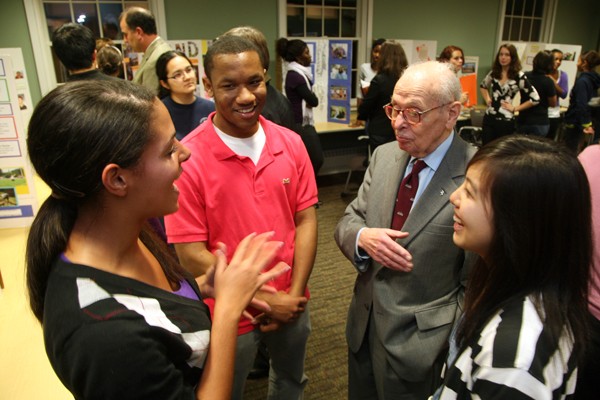One of America’s most successful and charitable patent licensing strategists passed away last week.
Eugene M. Lang, describe as “an American folk hero” for his generous philanthropy, grew up on Manhattan’s East 83rd Street in a $12 per month railroad flat.
He went on to donate more than $150 million to charities and institutions during his lifetime for educational causes, including the I Have a Dream Foundation, which he established in 1981; the Eugene Lang College, part of the New School in Manhattan; the Eugene M. Lang Center for Entrepreneurship at Columbia University School of Business; and Swarthmore College, which he entered at 15 on a scholarship.
Much of Lang’s fortune was derived from the Refac Technology Development Corporation, it was reported in his obituary, a public company he founded in 1952 that specialized in the licensing of patents and financing high-tech ventures.
Thousands of Suits
“REFAC held patents relating to LCDs, ATMs, credit card verification systems, bar code scanners, VCRs, cassette players, camcorders, electronic keyboards, and spreadsheets,” reports Wikipedia, “and filed thousands of lawsuits against other corporations to secure licensing fees or out-of-court settlements, a business practice of some very large corporations such as Microsoft and Google as well as large startups such as Intellectual Ventures, and sometimes criticized as patent trolling.“
Some considered Refac International Ltd., known for suing thousands of big and small companies to protect its patents, the model on which other non-practicing entities (NPEs) were based. In 1990, the company was chastised by a federal appeals court in Washington after losing a major lawsuit it filed against 118 Southern California companies selling products with liquid crystal displays.
The New York Times reported that Refac — the name stands for resources and facilities — had made much of its money “by aggressively filing patent infringement suits against companies like IBM and Eastman Kodak and retailers like R.H. Macy and Radio Shack on behalf of inventors of a wide range of products: liquid crystal displays, automated teller machines, bar-code warning systems and spreadsheet software.”
In a letter to The Times [valuable for its historical and factual content], Mr. Lang called the article “grossly distorted” and pointed out that most of the clients represented in lawsuits had sought out Refac after offering licenses to the corporations for their inventions and being turned down.
He illustrated his argument by citing the inventor of the laser who had tried to get industry to recognize his role and succeeded only after Refac won validation of his patents in the courts.
“For Refac, the drama of litigation began in 1975 when Gordon Gould, after battling industry opposition since 1959, asked us to represent his claims as inventor of the laser,” wrote Lang.
“Concluding that Mr. Gould’s claims had genuine merit, Refac, against all odds, accepted the challenge. It took until 1987 and some $4 million, but the courts finally validated every patent of Mr. Gould’s. Despite vituperative reactions from the laser industry – analogous to quotations cited in your article – claims that in 1975 might have been labeled ”all but worthless” now generate annual royalties in excess of $12 million.
Impulsive Gesture
A self-made businessman who flew coach class and traveled on subways and buses, Lang is best remembered for his impulsive gesture in June 1981, when he was invited to deliver the commencement address to 61 sixth graders at Public School 121 on East 103rd Street in Spanish Harlem. He had attended P.S. 121 as a boy 50 years earlier.
He made himself personally available to the students, counseling them when they faced obstacles such as teen pregnancy, addiction, and delinquency. He cheered them at their graduations and helped arrange for jobs. When a student was incarcerated at Sing Sing, he helped him pursue college course work from prison.
In addition to his daughter, Jane Lang, a Washington lawyer and community activist, Lang is survived by two sons, David and the film and stage actor Stephen Lang (Avatar, Conan the Barbarian, Gettysburg); a sister, Barbara Lang; eight grandchildren; and eight great-grandchildren.
In 1996, President Bill Clinton awarded Mr. Lang the Presidential Medal of Freedom.
For more information about the Eugene M. Lang Foundation, go here.
Image source: thenewschoolhistory.org; newsworks.org



Bruce,
IBM took the first license Refac granted under the Gould patents whicl seal of approval opened the door and, for which Gene, a good friend, was forever grateful.
Refac’s President, Phil Sperber, sued IBM a few years later under a patent related to ATMs. REfac lost a summary judgment in Federal District Court, as well as one of the early appeals to the CAFC. IBM was awarded damages for a frivolous suit and I collected a fat check from Gene, as well as a nice lunch.
He was one of the nicest men I ever met.
Emmett
LikeLike
Emmett,
1990 was the beginning of a “golden age” for patent licensing, which coincided with a U.S. technology boom. History can and does repeat itself, but it is unlikely without cooperation from lawmakers and the courts.
Bruce
LikeLike